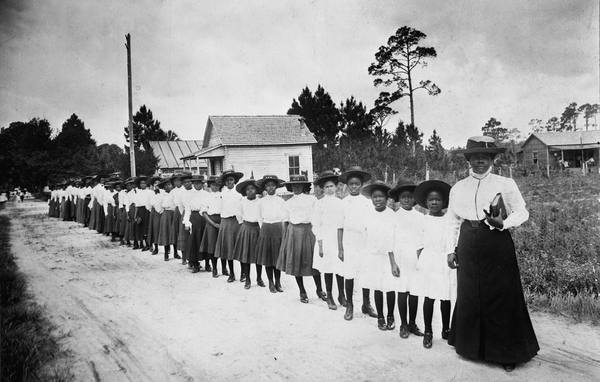
Mary McLeod Bethune leads a line of girls from the school she founded. ca, 1905. State Archives of Florida, Florida Memory
More than a century before educators launched new schools for inner-city children in Orlando and Overtown, and more than a generation before Marva Collins created a pioneering private school in inner-city Chicago, there was Mary McLeod Bethune, who founded the Daytona Literary and Industrial Training School for Negro Girls in Daytona Beach, Fla.
Fourth-graders learn about Bethune in their Florida history classes, and many have heard of the university that bears her name. Her legacy also resonates in the school choice movement, with good reason. In a Context Florida column calling for a new school choice program named in her honor, William Mattox of the James Madison Institute draws a connection between the school she started and the newer waves of transformation enabled by educational choice.
[T]he Gardiner Scholarship expands the educational marketplace much like Bethune’s private school did a century ago. It gives new options to students whose needs are not being met by their local district school.
And by allowing parents to roll over unused funds for future educational needs (including college), the scholarship encourages parents to be resourceful and seek out educational programs offering the highest possible quality at the lowest possible price.
Rewarding resourcefulness in the pursuit of educational excellence is perfectly in keeping with Dr. Bethune’s legacy. For while she is best known for her courageous leadership elevating the lives of black schoolchildren, Dr. Bethune modeled resourcefulness in her work.
In the early days of her school, she and the members of her church made school desks and benches out of discarded crates, ink for pens out of elderberry juice, and pencils out of wood scraps. And throughout her educational tenure, Dr. Bethune made certain that her students gained both academic instruction that captured their imagination and practical skills that equipped them for the marketplace.
There's another lesson from Bethune's legacy that matters to the school choice movement. Her extraordinary pluck and tenacity were fueled by a fervent desire to uplift members of her race, especially young girls, who were denied access to public schools, and as a result, the chance to participate in the American economic mainstream (hence her emphasis on literacy and industrial education). A school choice movement that honors her legacy would prioritize the needs of those students — especially low-income children of color — who are denied equal opportunity in the education system today.
Correction: We have corrected the spelling of Mr. Mattox's name. We regret the error.